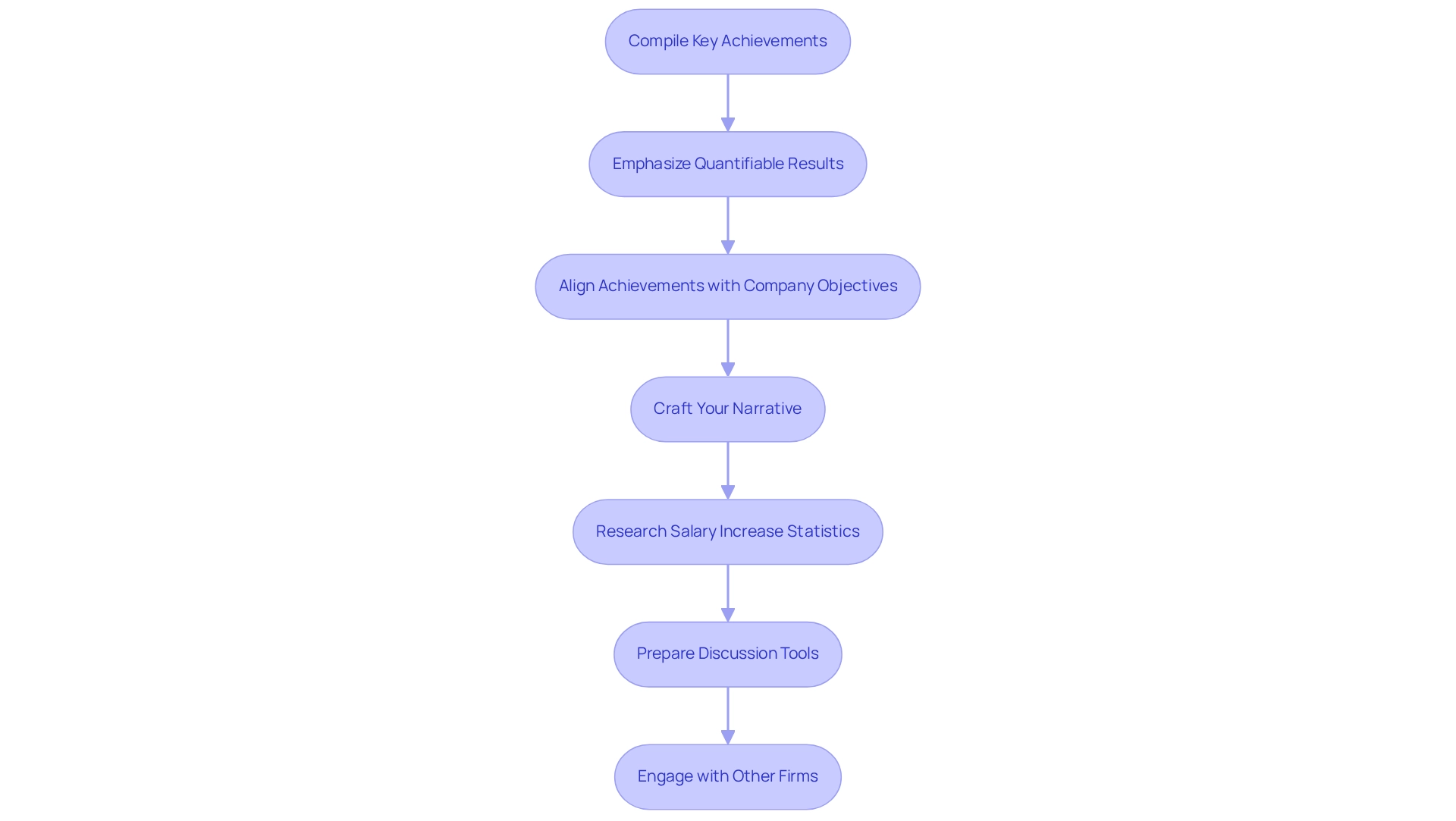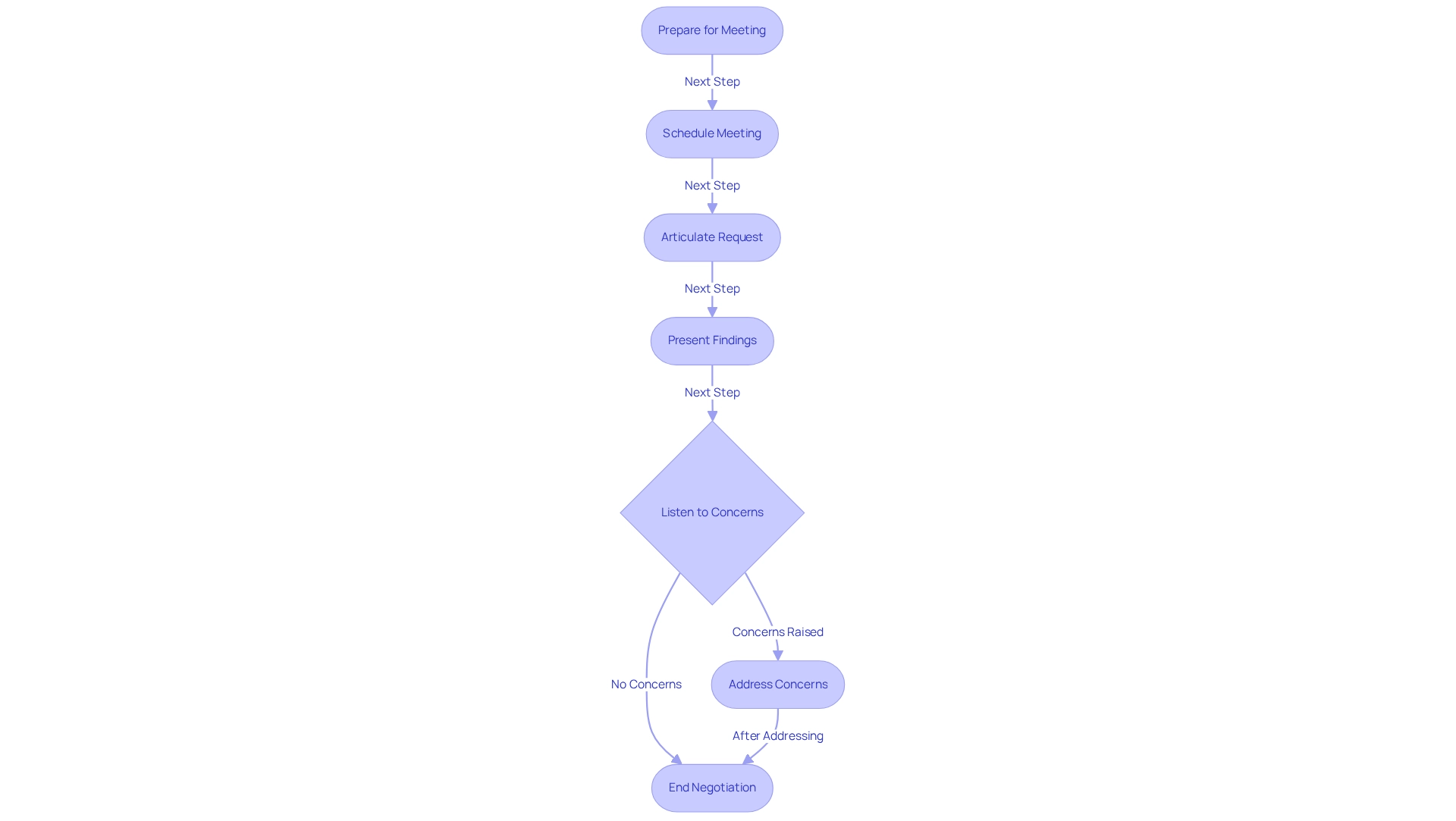Overview
To effectively request a salary increase, individuals must first evaluate their contributions to the organization. This self-assessment is crucial as it lays the groundwork for the subsequent steps. Next, conducting thorough research on market compensation is essential; understanding industry standards empowers individuals to negotiate confidently. Timing also plays a pivotal role in these discussions—identifying the right moment can significantly influence the outcome.
Moreover, preparing a compelling case that highlights one’s achievements is vital. Articulating these accomplishments with clarity and confidence not only demonstrates value but also reinforces the rationale behind the request. This structured approach, which encompasses self-assessment, market data collection, optimal negotiation timing, and confident articulation, is supported by evidence that thorough preparation markedly enhances the likelihood of a successful outcome.
Key Highlights:
- Evaluate your role by listing skills, experiences, and contributions to establish a foundation for salary negotiation.
- Research market compensation rates using resources like compensation surveys and platforms such as Glassdoor and PayScale.
- In 2025, HR managers in the financial sector will face competitive talent retention challenges, emphasizing the need for understanding market expectations.
- Identify optimal times for salary discussions, such as during performance reviews or after successful project completions.
- Consider your supervisor’s workload when scheduling discussions to maximize attention and receptiveness.
- Document key achievements with quantifiable results that align with company objectives to support your salary request.
- Prepare a clear and confident communication strategy for your salary request, using research and documented achievements as evidence.
- Be aware that the lowest pay increase typically negotiated is 5%, while the highest can be 100%.
- Avoid accepting the first job offer and consider long-term career objectives and values when negotiating compensation.
Introduction
In the competitive landscape of today’s job market, negotiating a salary can feel like navigating a minefield. Professionals must not only understand their worth but also the intricacies of timing, preparation, and effective communication. By assessing personal achievements and researching market rates, individuals can build a compelling case for their value.
Additionally, recognizing the right moments to broach the subject and articulating requests with confidence can significantly influence the outcome of negotiations. This article delves into the essential strategies for successful salary discussions, offering insights that empower professionals to advocate for themselves and secure the compensation they deserve.
Assess Your Value and Research Market Rates
Begin by evaluating your current role and responsibilities. Create a comprehensive list of your skills, experiences, and contributions to the company, highlighting specific achievements that demonstrate your value. This self-evaluation is essential as it establishes the foundation for your negotiation approach, especially when you ask for an increase salary. Next, carry out extensive research on market compensation rates for your role. Utilize resources such as compensation surveys, industry reports, and platforms like Glassdoor or PayScale to gather data on average earnings based on your job title, location, and experience level.
In 2025, the average compensation for HR managers in the financial sector is anticipated to mirror current trends, which suggest a competitive environment for talent retention. Organizations that emphasize robust leadership and career advancement will possess a clear edge in attracting and retaining talented professionals.
Consider this: as top candidates actively seek suitable opportunities, comprehending their expectations and the competitive dynamics of the job landscape will enable you to effectively ask for an increase salary during your discussion while advocating for your value. Understanding market compensation rates for HR roles in financial companies enables you to effectively ask for an increase salary that reflects your value.
Additionally, consider case studies that illustrate successful compensation negotiations within financial firms; these examples can provide valuable insights into effective strategies and outcomes. For instance, companies that have effectively managed compensation discussions often emphasize their dedication to a smooth interview process, ensuring that candidates feel appreciated and esteemed.
Moreover, organizations that promote employee well-being through equitable pay, adaptable work arrangements, and wellness initiatives can enhance job satisfaction and decrease turnover. This highlights the significance of knowing when to ask for an increase salary that accurately reflects your contributions.
Choose the Right Time to Ask
Identifying the optimal moments to ask for an increase salary within your organization is crucial for success. Key opportunities often arise during annual performance reviews when employees may choose to ask for an increase salary, particularly after the successful completion of significant projects or during periods of strong financial performance for the company. Notably, only 4% of organizations have a formalized mechanism for sharing negotiation learnings across their business divisions, highlighting the rarity of structured negotiation processes and the importance of timing in discussions.
Moreover, it’s crucial to consider your supervisor’s current workload and stress levels; approaching them during especially hectic periods may impede your chances of a fruitful discussion. As Melanie Masur, Employer Brand Specialist, observes, ‘Recruiters and hiring supervisors anticipate candidates to negotiate and to ask for an increase salary.’ To maximize your impact, aim to schedule a meeting when your supervisor can dedicate their full attention to your request. This strategic timing not only showcases your understanding of the organizational dynamics but also places you advantageously in the discussion process.
Furthermore, the case study titled ‘Bargaining Skills and Career Development’ illustrates how mastering these abilities, including timing, can significantly impact career advancement, providing practical guidance for HR managers.

Document Your Achievements and Prepare Your Case
Compile a comprehensive list of your key achievements, emphasizing quantifiable results that illustrate your value to the organization. Metrics such as revenue generated, projects completed, or process improvements can substantiate your contributions effectively. Craft a narrative that aligns these achievements with the company’s objectives, highlighting how they have positively influenced organizational success. This documentation serves as the basis for your discussion, providing solid proof to strengthen your appeal to ask for an increase salary. Research indicates that 70% of employees who ask for increase salary receive at least a partial increase, underscoring the effectiveness of a well-prepared case.
Furthermore, handling varying expectations in cross-departmental statistical projects is essential; aligning your accomplishments with organizational objectives can significantly improve your stance in discussions. Insights from the case study on global workforce search trends reveal that understanding industry dynamics and talent acquisition strategies can also impact salary discussions. Moreover, candidates can utilize discussion script templates and request letter guides to prepare their proposals, offering practical tools to aid their conversations. Consistently interacting with other firms can provide important insight into your market value, further enhancing your position during discussions.

Communicate Your Request Clearly and Confidently
Once you feel sufficiently ready, arrange a meeting with your supervisor to ask for an increase in salary. During this meeting, clearly articulate your request and be prepared to ask for an increase in salary, drawing on your research and documented achievements. Employ confident language and maintain a positive tone when you ask for an increase in salary throughout the conversation. Be ready to present your findings and demonstrate how they align with your contributions to the organization when you ask for an increase in salary. Remember, the lowest pay increase mentioned for negotiation is 5%, while the highest could be 100%, providing a concrete benchmark for your discussion. If your manager expresses concerns, listen attentively and be prepared to address them with additional information or alternative solutions. This method not only highlights your professionalism but also strengthens your dedication to the company, encouraging a positive discussion when you ask for an increase in salary.
As you navigate this process, keep in mind three essential considerations:
- The initial job offer may not be the best; explore all opportunities to ensure you are making a well-informed decision.
- Avoid the trap of taking the road of least resistance by accepting the first offer that comes along, as this may limit your potential for professional growth.
- Lastly, committing too quickly to a job offer can lead to regret; take the time to weigh your options carefully.
As emphasized by Boutique Recruiting’s remarkable history of achievement, effective bargaining strategies can result in advantageous outcomes. Moreover, candidates should take into account the wider context of their career objectives and values when discussing compensation, ensuring that their choices align with long-term aspirations. Ultimately, the ripple effects of compensation discussion training contribute to a more equitable labor market, making this investment a critical consideration for employers aiming to attract and retain top talent in an increasingly competitive landscape. A dynamic and motivated workplace results from effective salary negotiation training, further emphasizing the importance of this process.

Conclusion
Successful salary negotiations hinge on a well-structured approach that begins with a clear understanding of personal value and market trends. Assessing individual contributions and researching industry standards empowers professionals to advocate effectively for themselves. This foundational knowledge equips individuals with the confidence to enter negotiations armed with data that underscores their worth, ultimately leading to more favorable outcomes.
Choosing the right moment to initiate these discussions is equally critical. Timing can significantly impact the receptiveness of managers, with strategic opportunities arising during performance reviews or after notable achievements. Acknowledging the organizational context and your manager’s circumstances enhances the chances of a productive dialogue.
Additionally, clearly documenting achievements and articulating requests with confidence are essential components of successful negotiations. Presenting a well-prepared case that aligns personal contributions with the company’s goals not only strengthens the argument but also demonstrates professionalism. As professionals navigate the complexities of salary discussions, it is crucial to remain open to dialogue and prepared to address any concerns raised.
Ultimately, mastering the art of salary negotiation can lead to not just immediate financial benefits but also long-term career growth. By investing time in preparation and communication, individuals can secure compensation that reflects their true value, fostering a more equitable and motivated workplace. Embracing these strategies empowers professionals to take charge of their careers and ensures that their contributions are appropriately recognized and rewarded.
Frequently Asked Questions
How should I begin preparing for a salary negotiation?
Start by evaluating your current role and responsibilities. Create a comprehensive list of your skills, experiences, and contributions to the company, highlighting specific achievements that demonstrate your value.
Why is self-evaluation important in salary negotiations?
Self-evaluation establishes the foundation for your negotiation approach, especially when asking for a salary increase, as it allows you to clearly articulate your value to the company.
What resources can I use to research market compensation rates?
Utilize compensation surveys, industry reports, and platforms like Glassdoor or PayScale to gather data on average earnings based on your job title, location, and experience level.
What is the anticipated average compensation for HR managers in the financial sector in 2025?
The average compensation for HR managers in the financial sector is expected to mirror current trends, indicating a competitive environment for talent retention.
How can understanding market compensation rates help in salary negotiations?
Knowing market compensation rates for HR roles in financial companies enables you to effectively ask for a salary increase that reflects your value during negotiations.
Are there any examples of successful compensation negotiations I can learn from?
Yes, consider case studies that illustrate successful compensation negotiations within financial firms, which can provide valuable insights into effective strategies and outcomes.
What role does employee well-being play in salary discussions?
Organizations that promote employee well-being through equitable pay, adaptable work arrangements, and wellness initiatives can enhance job satisfaction and decrease turnover, emphasizing the importance of knowing when to ask for a salary increase that accurately reflects your contributions.